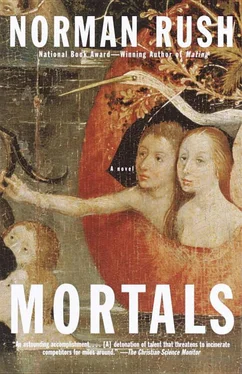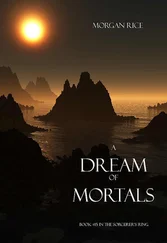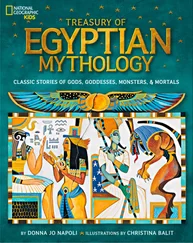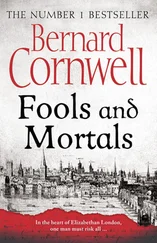It was fun to put one of their uncomfortable metal lawn chairs in the center of one of the microlawns and sit there in the imperfect, lacy shade of the thorn trees. The trunks of the trees in the yard were properly lime-washed to protect them from termites, except for the palms, which had some natural resistance. There was a crate by the wall to stand on in the event something interesting seemed to be going on in the street. His wall was pink. He even liked the street itself. He liked the broad, clean, faintly convex roadway and the astringent odor given off by the gum trees planted along it. If he’d kept on teaching in the U.S. they might well have ended up in a university town someplace in the Southwest that looked pretty much like this part of Gaborone.
It always made him happy when the gate clicked shut behind him. Paradise was from the Persian for walled garden, probably the first fact anybody tackling Milton learns.
He thought, I ask them, What do you think the word paradise means? and they say various things. Their definitions of paradise are so modest: They reveal themselves: They begin to think about it: Odd that nobody in Gaborone knows what paradise means except me and my students and Iris. He lingered on the stoop. It was time to go in. If he waited Iris might stop whatever she was doing and come to let him in. If he waited the entire lower sky to the west would turn burnt orange. Ray liked working in the heat, being conscious of it. It was tonic for him, for some reason. Fikile was wondering why he wasn’t going in, by now. You get a slight continuous feeling of virtue from working in the heat, on a level with wearing wristweights all day, he thought. He should go in. The best heat was now, in December. The west was solid orange and the peak of the sky was apple green. Woodsmoke drifting from cooking fires in Bontleng and Old Naledi would color the air for the next couple of hours, fading in and out, never overpowering, more a perfume, to him. Fikile would start toward him in a minute if he didn’t go in. I would have been nothing in America, Ray thought. When he imagined what he might have been if they hadn’t come to Africa it was painful. Not that Iris would credit any scenario in which his qualities went unused and unrewarded. She adhered to the great man theory of marriage. She loved him. Coming to Africa had been essential, but he had to be alone in knowing it and knowing why. That was the deal. It was unfair that something was going wrong with her just at the moment you might say all the moving parts in the machinery of his life were in order. He could walk to work. His health was fine, his weight was perfect. He thought, I love Africa, but not like the idiots who come over here and say Boy! Women with mountains of sticks on their heads. Look, an ostrich crossing the road!
Nothing is more useless than dwelling on grievances, he reminded himself, feeling himself about to twitch in that direction. He’d earned the right to some satisfaction. The easy part of his life had begun unannounced like a dream two years ago and he had a right to enjoy it. No one could know about it, obviously, but he was living in a state of triumph, and had been ever since Russia and all its works blew apart overnight. Before that he had been part of a war. What he was in now was more like a parade. Of course nobody knew who he was, except for Iris who had to know generally. She had no details. But when somebody wrote The Decline and Fall of the Russian Empire and Everything Connected with It he would be there between the lines. He couldn’t generate the right metaphor for amazing 1989. He had an image of something like a metal claw sunk into half the planet suddenly disarticulating, but that was a weak image. Or it could be like this, he thought: You have a goliath of an enemy dressed in armor about to smite you who sits down suddenly and looks faint and when you open up his armor you find only his face is normal, the rest is sickly, mummified, and then he dies in front of you and it’s all over.
This moment was what Iris was suddenly taking away.
The event was too huge for any image he had been able to come up with. It would take someone as great as Milton to come up with the appropriate image right off the bat. He felt he had no time to think, lately. Iris was full of mental homework for him to do that he didn’t want to do, such as answering the question of why they had been so attracted to one another when they met — but it had to be aside from the purely physical reasons she knew he was going to overemphasize.
He stood in the foyer. No one was around. He heard the kitchen door close. That was Dimakatso leaving for the day.
He entered the chill bronze gloom of the living room, where the airconditioner was laboring for his benefit, obviously, since no one else was on hand and the room looked as though no one had made use of it that day. He walked over to the main double window. The louvers of the blinds were tilted downward, almost to the closed position. All the windows in the house were barred and tightly screened. He was fanatical about the screens. There was malaria nearby. He was the force behind both of them continuing to take chloroquine. Iris got worse headaches from the chloroquine than he did, so he understood why she resisted him. There was still no one.
But I’m fine, he thought, trying not to relive a moment from the walk home that had made him feel fragile. Near the school was a rundown property whose occupants kept a goat. The goat had run up purposively to the fence as Ray came by and for an instant Ray had thought something monstrous was happening, because the goat’s tongue seemed to be a foot long. He’d been frightened until he’d realized that it was only a goat eating a kneesock. Iris could be asleep. He would look for her, softly.
Ray moved silently through the house, coming to the shut door of Iris’s workroom, her study. He knew everything about her study, every detail. He kept silent.
She was in there, at her worktable, doing something with papers, airletters, probably. Three times recently he had come to the door in silence and been privileged to hear her reading aloud to herself from letters sent by her sister or, once, his brother. Privileged was the only word for the way he had felt. Obviously, reading aloud was a sign of loneliness. He couldn’t deny that. She animated her correspondents when she read aloud, bringing them to her. She read with feeling, theatricality, even. The transom over the door was always in the open position. He wanted to hear her read aloud again. There was something rare about it.
Yesterday she had gotten sunburned. He could hear that she was intermittently picking up a sponge or cloth from a bowl of ice, wringing it out, and touching it to her face.
Storage dominated the small room. Metal filing cabinets came to chest height along three walls and were topped with a double tier of uniform cardboard cartons, each carton marked with a code number. The one break in the tiers of boxes was utilized to house a portable phonograph and behind it a tight rank of longplaying record albums. A postal scale stood on top of the block of albums. There was no decoration on the exposed white upper walls or anywhere in the room, and no rug or mat on the maroon linoleum tiles of the floor. A copy of the International Herald Tribune folded twice would be aligned with the upper right-hand corner of the table. Through the transom came a remnant scent of cleanser.
Her room was hot and dim. There was no table lamp. If Iris found something she wanted to read closely in a letter, she would slant the sheet to catch the dying light from outside. There was one double window, and the short side of her worktable was pushed to the wall directly underneath it. The wings of the window were normally cranked out to their maximum extension. She would be sitting with her left side to the screened and barred view of the servants’ quarters fifty feet away. An arbor supporting a system of dead vines framed her view. On the tabletop, in addition to the newspaper, was a dust-hooded bulky typewriter set to one side and a tray of office necessities, like ballpoint pens, Wite-Out, type cleaner, and postage.
Читать дальше












